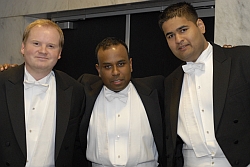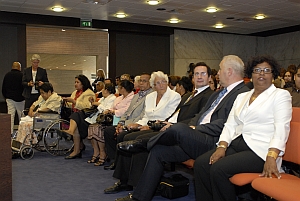How to make the best of your teams – managing team performance
On June 11, <link people bart-dietz _blank>Bart Dietz has defended his PhD thesis entitled “<link erim events _blank>Managing (Sales) People towards Performance: HR Strategy, Leadership & Teamwork”. In his thesis, Dietz explores several business relevant topics in the field of HRM. His findings indicate that managers can indeed manage people towards performance by managing the organisational environment
 Dietz emphasises that managers should seek alignment in designing HR strategies. They can do so by conceptualising their HR strategy as a system of attributes and actively consider complementarity effects between all attribute values. This way, HR strategies move from a set of best practices towards a synergic system.
Dietz emphasises that managers should seek alignment in designing HR strategies. They can do so by conceptualising their HR strategy as a system of attributes and actively consider complementarity effects between all attribute values. This way, HR strategies move from a set of best practices towards a synergic system.
Second, leaders should realise that they can affect the goal orientations and adaptivity of employees via transformational leadership behaviour. Here, an important note is that his study shows a negative effect of learning goal orientations on performance. Apparently, a motivational drive to learn new things can be dysfunctional for performance.
Third, the results inform business leaders that the performance of individuals can be enhanced, but can also be harmed by the teams in which they are placed. More specifically: (a) the performance of people can be augmented by being a member of a team wherein members overtly reflect on team-processes (i.e., is reflexive), but (b) the impact of this reflexive process is contingent of the team's age-diversity. In teams with high age-diversity, reflexivity makes individual experience more role ambiguous and thus harms performance. In teams with low age-diversity, reflexivity makes individuals experience less role ambiguous and hence increases performance.
About Bart Dietz:
Bart Dietz is Assistant Professor of Human Resource Management (HRM) at Rotterdam School of Management, Erasmus University. He earned his PhD in General Management in 2009 from the Erasmus University Rotterdam, and his MSc in Business Administration (Marketing) from the same university in 2002 after an exchange semester at Brandeis International Business School. His research focuses on HR Strategy, Leadership and Teamwork, with an emphasis on field-studies of Salespeople. He presented his work at major international conferences in Management (Academy of Management), as well as in Marketing (American Marketing Association), and is regularly invited as a speaker for practitioner audiences. He is author and co-author of various book chapters and articles, some of which have been published, for instance in the Journal of Marketing. He also served as an ad-hoc reviewer for the Journal of Marketing, the Journal of Organizational Change Management, and Maandblad voor Accountancy & Bedrijfseconomie. Bart teaches courses in HRM at the Bachelor, Master and Executive levels, and has been nominated teacher of the year for undergraduate teaching. His past research and consulting clients include Manpower, Deloitte, Eneco, ZP Group, Heineken, Cap Gemini, ING, and Rabobank. During his MSc. studies, he performed an internship at the global sales headquarters of Elsevier Science (New York), and worked in personal selling for more than five years at Hans Verkerk/Interset Keukens, where he won multiple competitive sales awards.
 Abstract:
Abstract:
Managing people towards performance is one of the most critical priorities for managers in practice. This important issue is the focus of the dissertation as it explores how HR strategy, leaders, and teams have impact on performance. The dissertation addresses respectively how HR as a system of coherent attributes, multiple dimensions of transformational leadership, and team reflexivity can enhance the performance of (sales)people in organizations.
Based on a series of field-studies, the present dissertation demonstrates a number of novel insights. First, it reveals that internal coherence of HR strategy has a positive effect on organizational performance. Second, it demonstrates that both a leader’s level of transformational leadership, as well as a team’s level of reflexivity can be functional, but also dysfunctional for job performance of people in organizations.
These results are important for managers, as they represent evidence-based insights, some of which are counter-intuitive, on how they can effectively manage people towards performance. For researchers, the findings contribute to a deeper understanding of the HR-performance relationship.
More Information
Pictures of the Event
Full Text of the Dissertation


